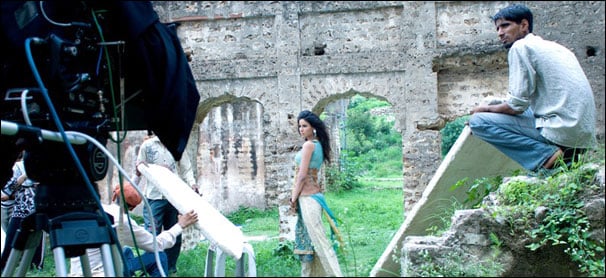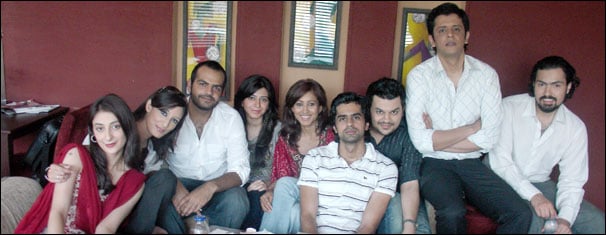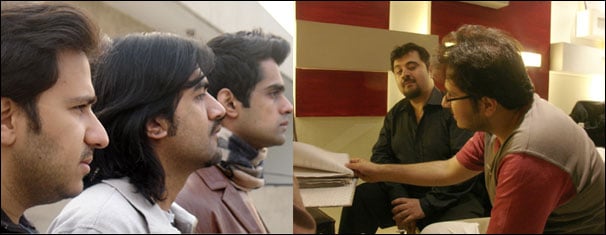|
|
| |
tv prodigy
Talking TV with 'Talking Filmain'
Film clubs started up after the Second World War to promote
cultural exchange in Europe and democratic consciousness. This
lofty ambition still holds true today in Pakistan 60 years later.
A film club started up in Lahore by three budding film aficionados,
which was initially a neighborhood video shop, has blossomed into
a full fledged TV production house called 'Talking Filmain'.
By Savaiz
Bokhari
|
| |
 |
| |
|
'Talking Filmain' made
their first serious effort into the world of filmmaking by producing
a (commercial) documentary called 'Muslim Gear' and a short film
titled "Paid in Full" (for a grant by the National Film
Board, Canada) in late 2002.
Their next attempt, another short film called "Profile"
was accepted to the Philadelphia, Vancouver and Kara film festivals.
Among their more recent international exposure is their work on
the 'international' feature film "Kashf" which is going
for preview at the Berlin & Cannes Film Festivals.
However, critical acclaim alone doesn't feed a hungry belly, so
'Talking Filmain' in recent times has struck commercial gold with
their (and perhaps Pakistan's) first non-game reality show "Pounds"
(for GEO TV) which they shot in August 2005. Two of their serials
'Bus Yuhin' & 'Saath' have already been aired and their third
serial 'Ye To Hona He Tha' is currently airing on HUM TV. Their
first tele-film '14 Days' was recently selected and aired for HUM
TV's Tele Film Festival 2008. They have also ventured into the field
of music video production and produced a commercial-cum-fashion/music
video for designer Saadia Mirza.
In the works for Talking Filmain are the video for a music single
by Ali Sher, as well as production for their fourth serial. They
are also currently editing their first documentary on Pakistan,
which is rather aptly called "Made in Pakistan". They
shared their views with Instep on the current disorderly state of
affairs of Pakistani television industry and possible remedies...
|
| |
 |
| |
|
What's
up with Pakistani Television, yo!
Rizwan Saeed, Partner and Post Production Head at Talking Filmain
says that "It's encouraging to see more and more players enter
the market - be it in terms of production houses or TV channels.
Additional TV channels mean additional avenues of distribution for
the production houses, so that is a plus!
However, given the exponential growth that our industry is experiencing
momentarily, the quality has really started to suffer. I mean, before
this media boom, competition was quite tough therefore excellence
was essential (everyone had one channel to sell to so content had
to be good). Content was more original, actors were more dedicated
to their projects and producers were more sensitive towards art.
But now with all the heavy advertising, commercialism is threatening
to take over art. Everything must be "mega", include glitz
and glamour and have an all-star cast. In this race of earning greater
business, we've lost our original flavor- the true essence of the
Pakistani drama, by adopting the Indian soap formula."
Nasir Khan, Partner and Producer/Director at Talking Filmain agrees,
"The focus of most producers and directors has shifted from
content to glamour. The most vital factor in the success of any
production is the script and people seem to have forgotten this.
What the majority fail to understand is that just casting huge stars
will not make the show a success because those stars come in every
other show, so how is your show different? "
Rizwan adds on about the quality of entertainment in Pakistan today
- "While news channels are on a quality rise, it's becoming
increasingly hard for most entertainment channels to maintain quality.
Unwanted time checks are offered every 15 minutes and ad bars cover
half the screen anyway, distracting audiences. So whereas, on the
one hand, business is improving, it's the art that has started to
suffer."
Adil Sher, Partner and Producer/Director at Talking Filmain has
a more in depth perspective on where the problems initiated - "The
first industry to suffer in Zia ul Haq's regime was the entertainment
industry. As time passed, perception of people was changed and any
association with media was deemed un-Islamic and disrespectful.
Now two decades later our government has suddenly realized the importance
of media. However the government's approach towards this industry
is as senseless as it has been since long.
For any industry to prosper it requires a solid and efficient support
system to take it ahead. In Pakistan, it is expected to prosper
without any such system. We don't have enough qualified people and
institutions to polish the immense raw talent which is being wasted
as we speak. No initiatives such as scholarships to aspiring film
makers to go abroad and get specialized degree in filmmaking or
electronic media, no relief on import of equipment is given. We
see all the channels running without above mentioned resources,
which is why they fail to provide quality entertainment to viewers
in Pakistan. Our government should now seriously look into the matter
and do the needful."
|
| |
 |
| |
|
Where do we go from here?
The key aspect is trying to understand what direction we need to
go in - Talking Filmain has some useful insights for how to resolve
the issues plaguing the entertainment industry in Pakistan today.
Rizwan says, "There are no short cuts in life, and it's the
same for this situation as well. We must begin with the basics and
the first step towards better quality production is skilled manpower.
Be it writers, actors, light men or camera-crew - they all need
some theoretical knowledge to back their talent. We need to have
different workshops related to this field on a regular basis to
train existing manpower as well as more and more film schools to
train future talent. In fact, just like a debating society and sports
club, schools must also include a performing arts society at primary
and junior levels.
Quality check is another key requirement of our times. Again, this
can easily be achieved if we have an independent organization like
the Academy to recognize and appreciate deserving talent from all
TV channels in Pakistan, and to judge them on a common platform.
And for an unbiased and impartial award function to take place -
all favoritism between Karachi and Lahore must be removed. In short,
that's my take on it."
Adil Sher thinks the key is to change the people's perception so
they don't feel hesitant in sending their children to a film school,
and the youth should be encouraged to take up filmmaking as a career
by offering scholarships in colleges within the country and abroad.
"Additionally, we should get help from professionals abroad
(could be India for their geographical practicality) and convince
them to come and teach in Pakistan. Schools should be opened up
which cover script-writing, acting, direction, film & TV production
in detail. These institutions should have enough resources to afford
the latest equipment to facilitate this process.
Infrastructure needs to be developed to help existing talent pursue
projects they believe in along with financial support from the financial
and business communities. Another element is to develop a long term
strategy which will protect local filmmakers from competition from
abroad. For example, in Canada a certain percentage of the content
seen on TV or in cinemas has to be made in Canada."
Nasir Khan talks about judging the 'success' of TV shows - "The
most important thing we need right now is to have a barometer to
judge the success of a show. There needs to be a system in which
channels can find out how many people are watching which shows.
In India they have the TRP ratings. This can give an honest evaluation
of what is working with the audiences and what isn't. The more successful
the show more money it will make and since majority of time good
content warrants success the state of television will definitely
improve.
As far as producers/directors are concerned I think they need to
realize that content/script is the most important element in the
success of any show. This is a lesson that can be learnt wherever
they choose to look for inspiration. Although it might be easier
to sell content now because there are so many channels around it
is difficult to make that content stand out. The only way to have
your name mean something or have the audience expect to be entertained
when they see your name roll in the credits is by working hard.
It is the key to having value attached to your name thus whenever
you produce or direct something your aim should be to build on that
reputation. You just cannot make content for the heck of it; make
it because you believe it will inspire and entertain people like
Pakistani dramas did in the past."
Wise words indeed! Here's to hoping more and more production houses
focusing on quality emerge on the Pakistani entertainment scene.
Talking
Filmain's work can be found online at YouTube and IMDB. |
| |
|

